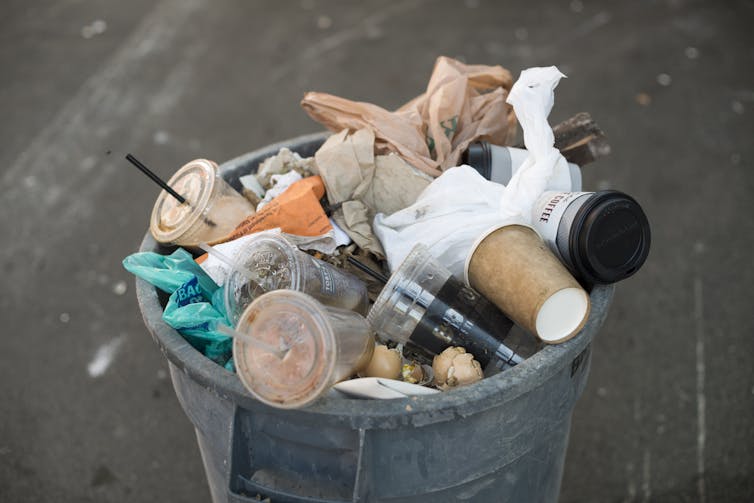Vincente Sargues/Shutterstock
Of the many ways the coronavirus pandemic has changed our lives, the banning of reusable cups by many cafes and other outlets serving hot drinks probably doesn’t appear at the top of most people’s lists. But the move is likely to add to the mountain of waste piling up as the pandemic has led to a reliance on large amounts of single-use plastic and brought recycling to a halt.
Meanwhile, as lockdown restrictions lift, more people are able to visit restaurants or the homes of friends or family. And some may be concerned about eating with plates, cups and cutlery that other people have handled or eaten from.
In response, a group of scientists has endorsed the sensible use of reusable containers as safe and unlikely to contribute to the further spread of COVID-19. Here’s why that’s the case – and why cafes should lift their reusable cup bans.
Coronavirus particles are transmitted from person to person in droplets of moisture from the mouth and nose. This means coughs and sneezes are a key source of transmission, but deposits of saliva – for example, left on a cup when you sip from it – could also contain the virus.
The reasoning behind social distancing measures, such as keeping two metres away from others and wearing a face covering when closer to them for any length of time is to stop the virus being passed between people in public spaces. But studies show that cough and cold viruses tend to stay on surfaces, including plastic, for up to several days.
Early indications are that this is also true of the novel coronavirus behind the pandemic, SARS-CoV-2. And we also know that objects can play a significant role in the transmission of respiratory and viral diseases. (Scientists call objects that transmit disease “fomites”.)
Virus killer
There is still much that virologists do not know about the virus, but we do know that it is inactivated when it comes into contact with detergent. That means using soap on hands, disinfectant on surfaces and washing-up liquid on cups and plates are all ways to effectively kill SARS-CoV-2.
This is because the virus is surrounded by a fatty envelope, which must be intact for the virus to remain infectious. This is readily disrupted by detergent, such as washing-up liquid. This means reusable containers could actually be safer if they are regularly and properly washed than single-use ones that may have been exposed to the environment for a long time and not washed before use. A pile of used containers sitting in an overflowing bin could also be a risk.

My 2 Yen/Shutterstock
Of course, a washed reusable container could still become contaminated with and transmit the virus as it’s passed between a customer and a server. So cafes and bars will have to find a suitable way to serve drinks, such as the customer putting their own cup on a tray and passing it across a counter to be filled by a person wearing personal protective equipment. This would minimise the risk of the virus being inadvertently transferred onto the outside of a clean cup or glass by either party.
Many people are hoping that post-COVID-19 life will not involve a return to the same levels of consumption of the world’s resources. By the end of 2019, it had started to become normal to bring a reusable cup when buying a drink for takeaway outside of the home. Cafes and bars were more likely to serve food and drink to customers using china and glassware.
What we know about SARS-CoV-2 suggests the pandemic shouldn’t mean a return to single-use disposable cups and plates. In fact, there may be reasons to prefer reusable items. So perhaps it’s time to revive the tradition of bringing your own beer tankard to the pub.
![]()
Sarah Pitt does not work for, consult, own shares in or receive funding from any company or organisation that would benefit from this article, and has disclosed no relevant affiliations beyond their academic appointment.











